On May 22, in collaboration with the FEED Foundation, our Senior Program Officer Karen Kariuki held a conversation with FEED Founder & Chief Brand Officer Lauren Bush Lauren during our Dinner with a Purpose event. The sold-out evening highlighted female leadership, social entrepreneurship, and innovative ways to address food insecurity. In our Against the Grain series by Grace Farms, Bush Lauren is featured among several innovators including the Rockefeller Foundation.
FEED is an impact-driven brand founded upon the belief that food is a universal human right. Every FEED product sold provides school meals to children through direct donations to its on-the-ground partners. Since 2007, FEED has helped provide over 126 million school meals around the world and here in the U.S. For her work with FEED, Bush Lauren has received multiple awards, including Fortune Magazine’s Most Powerful Women Entrepreneurs in 2009 and Inc. Magazine’s 30 Under 30 in 2010. In 2015, she was named a World Economic Forum Young Global Leader. Lauren resides in New York City where she also serves on the Board of Directors for the Food Bank for New York City.
Their conversation has been slightly edited for clarity.
_______________________________
Karen Kariuki
We are so delighted to have you here. Whether this is your first time or you come back frequently, in either case, we’re just delighted to have you for this Dinner With Purpose. Our family has a collection and a tradition of collecting washers. Do you know what those are? The little round metal objects that go between a screw and protecting your piece of furniture. So we collect these around the world. We have them, we’ll see them on the ground outside the Eiffel Tower or in Brazil or in faraway places like Norwalk, Connecticut. And then we label them and they become part of our story as a family. And so we look back on them fondly because they have an origin, but they also have a set of values because it’s a set of values for us as a family that we are adventurers and we like to do things together.
And that the small things are the most meaningful things. So of course, a washer can just be a washer and a building can just be a building and a tote bag can just be a tote bag or it can be something that is imbued with a set of values and drives forth the set of purpose. And that is indeed what Grace Farms is. So we’re delighted that you’re here to experience that, but also that you carry that forward now that you’re here in your own way. Before Grace Farms opened, Sharon Prince, our CEO and Founder, encountered the concept that space communicates. And not only did she hold on to that, but she created this very space out of that. And so when you come to Grace Farms, you experience grace and peace and excellence and openness and new outcomes and you carry that forward. And so what that’s meant for us at Grace Farms is that we host hundreds of nonprofits here a year through our Space Grants program; we highlight businesses that are doing good in the world. We have people who come and can just be and have a cup of our Grace Farms Tea & Coffee or walk the trails. And all of that furthers our set of values and furthers our purpose. And of course, what it also means is that we get to partner with and highlight social entrepreneurs like Lauren Bush. Lauren, we’re so delighted that you’re here.
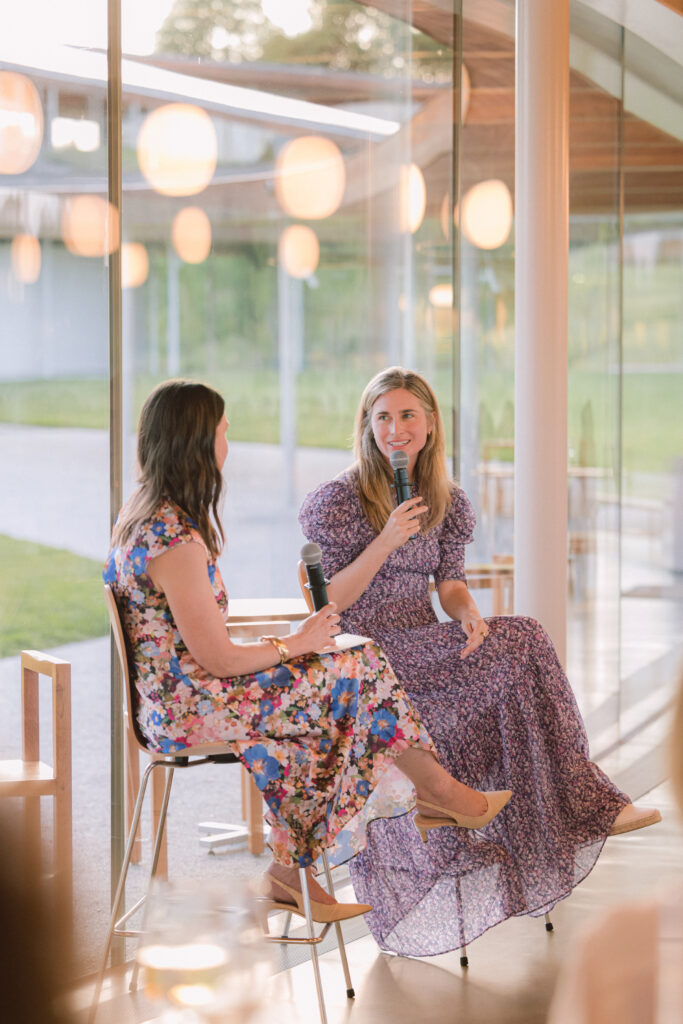
Karen Kariuki, left, our Senior Program Officer, and Lauren Bush Lauren, FEED Founder & Chief Brand Officer, hold an insightful discussion in our Commons.
It also means that we’ve launched global humanitarian movements like Design for Freedom, which I’m sure you’ll hear about at your tables this evening. Now, our partnership with FEED Projects actually began about four years ago when Covid came. We obviously had to close Grace Farms, but our work did not stop. We became a humanitarian hub and were providing PPE and food across the state of Connecticut, and beyond. And to do that, we do what we always do. We look to the best in the field and said, how do we do this well? And how do we do this with linking arms? And not in a duplicative way, but in an additive way. So, we went to people like David Barber who’s here with us this evening from Blue Hill at Stone Barn. We went to Lauren at FEED Projects, and they participated in something called Against the Grain, which was a video project highlighting leaders in the movement of addressing food insecurity and scarcity. So, we learn deeply with and from you, and this feels like a full circle moment. So, we’re so happy to have you. What you’re doing, Lauren at FEED is really extraordinary and profound and you’ve really led the way in terms of conscious consumerism and values led products in fashion and beyond. One of the things I love about the washer’s example and about Grace Farms is the origin story and how that got inspired. So I wonder if you might tell us a little bit about your journey and about how FEED Projects began and how that got inspired.
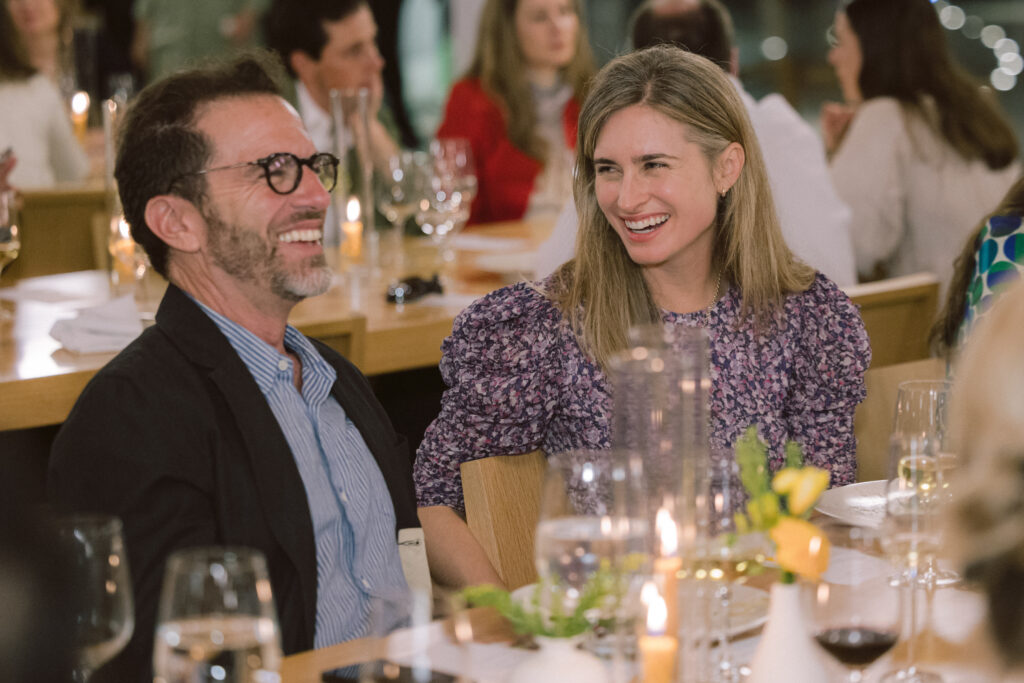
David Barber, Co-Founder & Owner of Blue Hill, a working farm, restaurant, and consulting company supporting agriculture that positively contributes to the world’s food system, with Lauren Bush Lauren, FEED Founder & Chief Brand Officer.
Lauren Bush Lauren
Everyone looks so beautiful and to give us your Wednesday night is really humbling. First, what an amazing space, it’s everything you just spoke of. I’ve been here with my kids, with our family and to have them interact with the buildings and the Court and the soccer field – it’s just magic. And I can’t wait to come back and do this. I just learned about there’s a snowshoe route, so I will be back many times. But thank you for creating this space and to imbue it with so much mission and integrity and activism and thoughtful conversations and programming. It’s truly unique.
Also, my whole organization is just thrilled to partner with you. So, my origin story, I started FEED 17 years ago, which is hard to believe. And I think we were talking to Sharon, that’s sort of when her journey with Grace Farm began as well. Although I had the idea as a student in college, basically I had the opportunity to travel around the world with the UN World Food program starting as a sophomore in college. That on-the-ground first-hand experience exposed me to the realities of hunger and poverty that affect over 800 million people around the globe are hungry. They wake up not knowing where their next meal is coming from. I’d go into these communities and in these countries and regions where that is the daily concern and reality. People are essentially living in this survival mode and not being able to make ends meet and put food on the table, really was like this eyeopener.
That on-the-ground first-hand experience exposed me to the realities of hunger and poverty that affect over 800 million people around the globe are hungry.
And I just feel so blessed that it came at this really amazing time in my life when I had my whole career and life ahead of me to think about what I wanted to do. And at the same time, I was involved in the fashion industry and really loving design. And so I had this kind of quarter-life crisis or pre-quarter life crisis of what do I do? How do I combine this love of entrepreneurship of design? I wanted to live in New York City at some point. I’m from Texas originally and I really want to make a difference. I really want to help the families and the communities that I met on my travels with the World Food Program. I was studying abroad in Australia. And in Australia no one uses plastic bags. So they’re decades ahead of the U.S. in this regard.
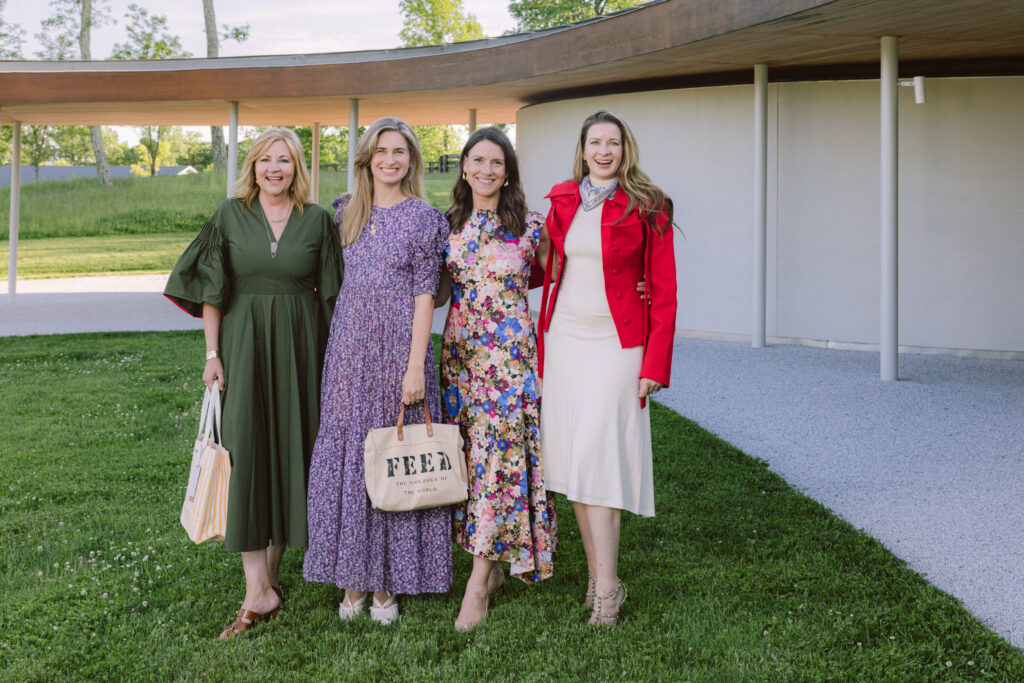
left to right: Sharon Prince, Lauren Bush Lauren, Karen Kariuki, and Chelsea Thatcher, Grace Farms’ Founding Creative Director. In the background is the River building that is surrounded by nearly 80 acres of natural landscapes.
For six months, I just saw reusable bags and I had this ‘aha’ moment of like, wait, I could design something that hopefully people want to carry, sort of like a badge of honor and have a tangible donation attached to it because unlike a lot of other extremely overwhelming world issues, we know how to solve hunger. It takes meals. And the program I specifically fell in love with is this sort of farm-to- school program I saw happening around the globe where the World Food Programme and other organizations like them will buy locally from farmers, from farmer co-ops, often giving them extra support so they can farm more effectively, and they have a promised sort of buyer for their crops and then that’s distributed locally to schools. So it’s this extremely vast safety net for so many kids and it’s the reason they go to school, stay in school longer.
It’s the reason in countries where girls’ education is less valued than boys’ education. Girls, they’re actually sent home if they go to school. But if they have a good attendance record, the World Food Programme will send the girls home with extra food for a family. So, they’re using food as almost like this bribery system to sort of even the playing field across gender. It’s a no brainer. And even in our own country. So, FEED supports global school feeding efforts, but also here in the U.S. we have breakfast in the classroom programs because so many kids go to school hungry and are hungry until that free or reduced-priced lunch. And there’s stigma around that still. And this breakfast program is just beautiful. Everyone is universal breakfast; every kid gets it. But that’s primarily, and essentially, I think what FEED has done that’s maybe slightly different than other social businesses is that each bag has a tangible give back. So, every bag you all got today gives 10 meals, 10 school meals to kids around the globe.
FEED supports global school feeding efforts, but also here in the U.S. we have breakfast in the classroom programs because so many kids go to school hungry …
Karen Kariuki
I love that because what you’re saying is sort of this value of being immersed. And Sharon, I know that you resonate with that deeply also as a social entrepreneur is that you really need to understand it deeply. And then what you’ve done is you’ve opened your hands and said, you’re creating an invitation for all of us to then come alongside this issue, which is so beautiful. And then of course creates exponential impact. What’s interesting to me is that what you said is that hunger is very simple. We need to create meals, but I think as we were beginning our journey as Grace Farms of how do we address food insecurity, particularly during the pandemic, it actually felt to me sort of this amorphous massive issue of like, oh yes, it feels like it should be that simple, but actually what is the best pathway to get there and how do you do that effectively? And so, I wonder because you have clarified it so simply, how did you get there? I think that maybe if I can speak on behalf of other people in this room, it actually feels quite daunting to me.
Lauren Bush Lauren
For sure, and it is very daunting. School meal programs make a ton of sense. So that’s the simplicity. Again, as a 20-year-old, I glommed onto and said, “This is the program I want to support.” And a few years after I started FEED, a for-profit B Corp social business. Again, we’re a very charitable for-profit business. And then a few years later we started the FEED Foundation, a public charity more to address the underlying systems issues. And that is extremely difficult and daunting because I mean, while school feeding has the dual multiple impact points, it is just the systems that keep people stuck in situations of hunger and poverty that we all need to look at more deeply.
Karen Kariuki
And you were really on the cutting edge of this, as I said, at the start of socially-driven business. But this idea to really put tangibly this number, how did that come to you?
Lauren Bush Lauren
It really came honestly from a shock of going on these trips and being in countries and seeing how so little goes so far and then actually the reverse shock of coming home and walking into a grocery store or Starbucks and getting your daily coffee and being like, wow, this coffee could have fed 50 kids. So the math of it started to really get to me and still does. There’s still just no way to wrap your head around that. So that’s truly where the number came from. And the whole premise is like, we’re all going to buy bags, we’re all going to buy stuff. Why not have those bags and also help with an issue like childhood hunger? It’s a no-brainer.
Karen Kariuki
Absolutely. One of the things that you just mentioned is that you have this duality in terms of your structure. It’s a for-profit business, but you have this foundation. Many of us in our minds can think of, oh, the vehicle to do good in the world is through the nonprofit sector, which of course it does. We’re increasingly seeing businesses take a social stand on causes. But how did you decide that beginning to be a for-profit business, and how has that model served you to advance good?
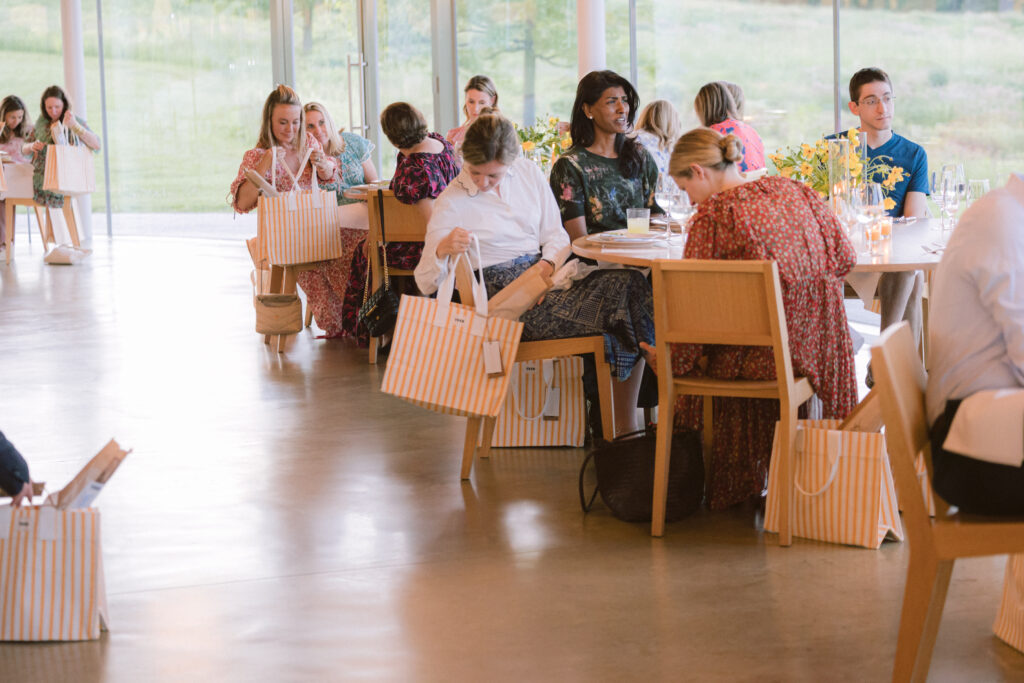
Similar to Grace Farms, FEED Projects started a movement with their mission-oriented approach to solving humanitarian challenges. Every FEED product sold provides school meals to children through direct donations to its on-the-ground partners. Event participants gathered in our Commons to learn more about FEED and support its mission.
Lauren Bush Lauren
It was the legal advice I got early on. It’s like, well, if your main mode of what you’re doing is trying to sell bags, and with that give back more, it’s straightforward to be a for-profit business. And then people would start sending us checks and I was like, oh, I feel weird sending away these checks, which I’d rather just sort of pass through to our amazing giving partners on the ground. And that’s when out of necessity we started the FEED foundation too. So I mean the dual model has served us well. I would say as a small organization the for-profit gets a lot more love and attention than we have given the nonprofit. And that’s something I want to focus more on is the system change part of what we want to address. But I do think it’s really a neat thing. I’ve had the opportunity over the last 17 years to have this front row seat to where when I’d walk in to meet with a company or a retailer I wanted to work with. They were like, oh, you’re a nonprofit.
If you’re a for-profit business and you don’t have a social mission, you are kind of behind the times.
And I had to explain, no, we’re for-profit, just work with us as you would work with any other company, and with that we’ll give back and help feed kids. And it took a ton of explaining, and now we don’t have to explain it now, it’s just part of culture and it’s part of doing business. And honestly, if you’re a for-profit business and you don’t have a social mission, you are kind of behind the times. Now, it’s sort of table stakes. So, it’s been really cool to see honestly, what made FEED super different early on is no longer the case because every company should have, and many do have, a really amazing social mission.
Karen Kariuki
Let’s just put a point on it. Part of the reason that transformation happened is because of FEED.
I think that it’s profound what you’ve done and to set an example for others and to show that it works and that there’s demand for it. To that end, can you tell us a little bit about these bags that everybody has at their chairs?
Lauren Bush Lauren
I know we are so thrilled to work with Grace Farms again, something like a love affair since we met. And yes, we designed this bag, especially for Grace Farms. You are the first to get them. Each bag gets 10 meals.
Karen Kariuki
We’re seeing the shift of people moving from a transaction experience. And again, you’ve been on the cutting edge of that. How have experiences like this, like the FEED Foundation suppers, foster brand experiences?
Lauren Bush Lauren
The beauty of starting something when you’re in your twenties, is that you don’t know all the rules, so you just go into it and you’re more fearless in terms of breaking them. So I really went into FEED being like, we’re not building a consumer brand, we’re not building a bag company, we’re building a movement. So with that as the lens, and I feel like that’s very similar with what Grace Farms is about. It’s all about experiential. And my journey too into all this started with experiential and I know not everyone’s able to go on these cool trips with your organizations and immerse yourself. Life gets busy. I know, I have three kids. My time is very different than it was when I started FEED. And yet to be able to bring our community along for the ride and expose them to the realities, and I think in a solution-oriented way because we’re inundated with bad news a million times a day. And to your point, hunger is extremely abstract and daunting and to say here’s a solution and it’s quick, easy, and fun. There is a way to do it and support [this cause], whether it’s through buying a bag, whether it’s through hosting a FEED supper, being here tonight. I mean it’s wonderful.
The beauty of starting something when you’re in your twenties, is that you don’t know all the rules, so you just go into it and you’re more fearless in terms of breaking them.
Karen Kariuki
It’s really meaningful. One of the things that we think a lot about at Grace Farms is this idea of hope and advancing good in the world, both by individual effort, but also doing so in the collective. And I think that there’s a lot of parity with your ethos at FEED projects. I’m wondering if you can share with us your sort of hope for FEED projects in the next few years or even looking forward a decade.
Lauren Bush Lauren
I mean, the ultimate hope is we disappear because there’s no need. I know that’s a lofty hope. I am open to what form FEED continues to take. I think over the last 17 years, the retail landscapes change, trends, change all these things. So I think part of being an entrepreneur is sort of trying to feel what that change is and what’s still relevant for FEED. So the mission and the why continues to be the same, but I’m sort of open to what form and what partnerships that needs to take. And like I said, I’m also very interested and maybe more interested than I even was in the beginning of what are the structural issues that are keeping people in a situation of continuing to need support and how can we better address those. I’ve been inspired, I think to your point of hope. I get so much hope in meeting like-minded on the ground people and I learn so much. So I’m learning every day, and I really want to be in partnership with those people who are out there on the forefront of addressing food security and really innovative, sustainable, and equitable ways.
Karen Kariuki
I know that I speak on behalf of all of us that we are going to be inspired to take action. And I think that your point is well taken that of course we can start movements by getting on a plane and going somewhere, but we can also join the movement by purchasing a bag and partnering with like-minded organizations and individuals and partnering with places like Grace Farms that are indeed launching movements. And now you are all part of that. So, on behalf of Grace Farms and everyone here, I want to say Lauren, thank you so much for joining us tonight.
_______________________________
About Grace Farms
Grace Farms is a center for culture and collaboration in New Canaan, Connecticut. We bring together people across sectors to explore nature, arts, justice, community, and faith at the SANAA-designed River building and Barns on 80 acres of publicly accessible, preserved natural landscape. Our humanitarian work to end modern slavery and foster more grace and peace in our local and global community includes leading the Design for Freedom movement to eliminate forced labor in the building materials supply chain.
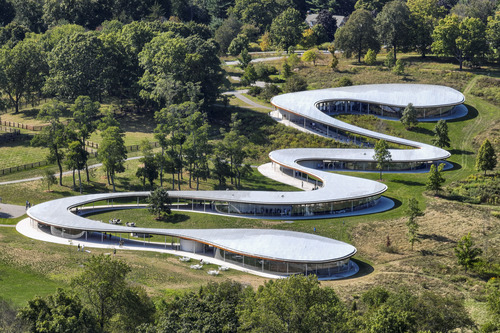
The SANAA-designed River building is embedded in 80 acres of natural landscape. Grace Farms is free and open to the public six days a week, other than Monday. Photo by Kyle Norton
Become a member
Grace Farms members enjoy special access to member-only events, experiential activities, and thought-provoking programs — and the opportunity to be a part of our mission to pursue a more peaceful world.
Learn more at gracefarms.org/membership
Visit our calendar of events to learn more about upcoming programs.
Sign-up for our newsletter
Follow us
@gracefarmsct #gracefarms

